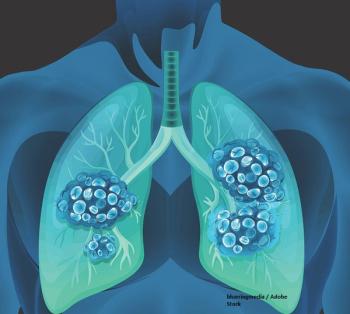
Multiple key efficacy end points continue to favor atezolizumab versus chemotherapy for patients with PD-L1–high, wild-type nonsquamous or squamous non–small cell lung cancer in the first line, according to a phase 3 trial follow-up.

Your AI-Trained Oncology Knowledge Connection!


Multiple key efficacy end points continue to favor atezolizumab versus chemotherapy for patients with PD-L1–high, wild-type nonsquamous or squamous non–small cell lung cancer in the first line, according to a phase 3 trial follow-up.

The investigational TROP-2–directed antibody-drug conjugate datopotamab deruxtecan will move forward in the treatment of relapsed/refractory non–small cell lung cancer, according to results from the 2020 World Conference on Lung Cancer Singapore.


Safety and antitumor activity of mobocertinib became evident after results of a trial involving EGFR exon 20 insertion–mutant non–small cell lung cancer were reported at the 2020 World Conference on Lung Cancer Singapore.

Liposomal irinotecan as second-line therapy for SCLC is feasible, safe after frontline platinum therapy failure.

Patients with KRAS G12C–mutated advanced non–small cell lung cancer show antitumor response and survival benefit with the KRAS G12C inhibitor sotorasib, formerly AMG 510.

Updated data from a phase 2 trial of apatinib added to single-agent chemotherapy for small cell lung cancer in patients with prior treatments indicate a good efficacy and safety for the combination.

Bellicum Pharmaceuticals, the developer of BPX-601, can now begin enrolling patients to their phase 1/2 trial again without modification to the study protocol.

Data presented at the 2020 World Conference on Lung Cancer Singapore reported gains in survival at the population and patient levels for those with SCLC treated with immunotherapy.

Results from the phase 3 ADAURA trial found extended disease-free survival for patients, irrespective of previous adjuvant chemotherapy received or disease stage.

A Japanese study supports the use of nab-paclitaxel for previously treated non–small cell lung cancer based on noninferiority end points being met.

Trastuzumab deruxtecan treatment demonstrated strong antitumor activity for patients with HER2-overexpressing NSCLC, regardless of HER2 expression levels, according to interim findings from the phase 2 DESTINY Lung-01 trial.

Results of the phase 1 CHRYSALIS trial demonstrated the safety and efficacy of amivantamab in patients with previously treated non–small cell lung cancer harboring EGFR exon 20 insertion mutations.

This ongoing study supports the continued development of AXL inhibition with bemcentinib in order to extend the efficacy of immunotherapy in biomarker-selected refractory non—small cell lung cancer, according to Matthew G. Krebs, MB ChB, FRCP, PhD.

Follow up data from KEYNOTE-799 demonstrated a high overall response rate with no new safety signals for patients with unresectable, locally advanced, stage III non-small cell lung cancer.

The associate professor of Thoracic/Head & Neck Medical Oncology at The University of Texas MD Anderson Cancer Center indicated that these data provide the first avenue for personalized treatment of small cell lung cancer.

Encouraging survival end points are observed with BMS-986012 plus nivolumab in immune checkpoint inhibitor–naïve SCLC, according to data presented at the 2020 World Conference on Lung Cancer.

An updated analysis presented at the 2020 World Conference on Lung Cancer Singapore expanded on data investigating pembrolizumab in the treatment of patients with PD-L1–positive NSCLC without sensitizing EGFR/ALK alterations.

“With recent advances in early detection of lung cancer, biomarker testing, and personalized treatment planning, effective patient-provider communication is more important than ever for short- and long-term survivorship,” said Kelly Clark, MA.

The phase 3 RATIONALE 302 trial demonstrated that compared to chemotherapy, tislelizumab showed a statistically significant and clinically meaningful improvement in overall survival in the intention-to-treat population of patients with advanced or metastatic esophageal squamous cell carcinoma.

Sohal spoke with CancerNetwork® regarding recent clinical data investigating 2 common pancreatic cancer treatment regimens: FOLFIRINOX and gemcitabine/nab-paclitaxel.

The expert in hematology/oncology discussed the implications of a study which evaluated the use of peptide receptor radionuclide therapy in patients with well-differentiated neuroendocrine tumors.

Following phase 2 success, the FDA provided Bioniz Therapeutics with guidance for the design of a phase 3 trial of BNZ-1 in patients with relapsed or refractory cutaneous T-cell lymphoma.

During the age of systemic immunotherapy, investigators observed a change in the incidence of second primary cancers after metastatic melanoma that included solid tumor and hematologic malignancies.

Investigators found that the number of metastatic lymph nodes and the presence of extranodal extension are complementary for predicting disease-specific survival in head and neck squamous cell carcinoma, suggesting the necessity of incorporating these factors into staging systems.

The founding executive director of the GI Cancers Alliance discussed important takeaways from a study of patient perspectives of clinical trial participation during the COVID-19 pandemic.

The increasing use of checkpoint inhibitors and other immunotherapies has created a need for the development of a cohesive education program and list of guidelines for treating common toxicities.

Though previous reports have suggested that an EGFR tyrosine kinase inhibitor plus an anti-VEGF agent might offer benefit to patients with brain metastasis or pleural effusion, the study authors could not identify its advantage.

The randomized, open-label, phase 3 FeDeriCa trial tested the safety profile of pertuzumab and trastuzumab plus hyaluronidase-zzxf in 500 patients with HER2-positive early breast cancer.

A study found a number of factors associated with increased recurrence risk for patients with locally advanced pancreatic neuroendocrine tumors following surgical resection, including sex, lymph node metastases, and resection of other organs with tumor involvement.